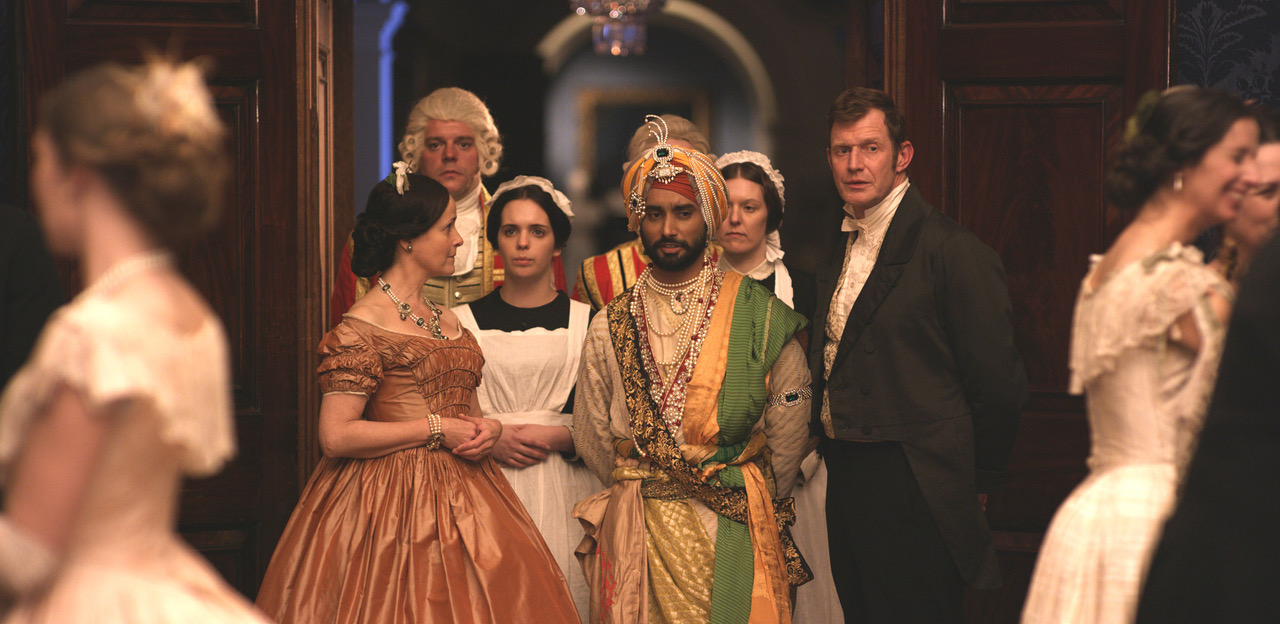
The latest cinematic retelling of British-Indian colonial relations comes in the form of a historical epic, featuring the critically-acclaimed Punjabi Sufi singer and poet Satinder Sartaaj. The Black Prince chronicles the life of Maharajah Duleep Singh, the last Maharaja of the Sikh Empire in Punjab, India, in an often overlooked chapter of British Indian colonial history.
The real story of the “Black Prince” and his survival through British colonialism is as dramatic and heartbreaking as you’d expect, and ripe for retelling. After the death of Sikh Maharaja Ranjit Singh, ruler of the Punjab, the region underwent a violent war of succession until the monarch’s youngest son, then five-year-old Duleep Singh, was installed as King. However, following power struggles between Duleep’s mother and the British, Duleep was exiled to England where he was raised as a Christian under the personal care of Queen Victoria (played by Amanda Root). After experiencing flashbacks of his home and early childhood, Duleep sought to find out more about his culture and to meet his real mother. The “Black Prince”, a nickname given to Duleep by Queen Victoria, soon learned that he was in fact the King of his homeland and the only person who could overthrow the British and free the people of Punjab.
“Having been raised as a Sikh, it’s refreshing to see an otherwise overlooked chapter of the Punjab’s history being given exposure on screen”
After taking a year out of the music scene to prepare for the role, Sartaaj was honoured to take the project on: “It’s a huge responsibility on my shoulders as I’m portraying the most important figure of my culture, the last King of Punjab”. Like much of his art, Sartaaj’s performance is charming and even earned him a roaring applause from the audience on the opening night of London Indian Film Festival at the BFI Southbank. Ameet Chana of Bend It Like Beckham and Eastenders fame, pulls off the part of a villain with ease, showing his depth as an actor that does more than “really, really like Beckham.”
Whilst in the presence of Queen Victoria, Sartaaj’s character spends much of the opening scenes with minimal dialogue, and there is little chance for the audience to see the singer put his acting practice to use. The use of the native Hindi and Punjabi languages in the dialogue is refreshing as it gives the film an authenticity that is hard to capture in English-language period dramas. It is when Duleep Singh’s mother, Maharani Jind Kaur, played by a veteran of Indian cinema, Shabana Azmi enters, that the leading actor comes to life through his largely Punjabi-language dialogue. Azmi seamlessly portrays the rightfully angered Maharani of the Punjab, who has been left without a clear vision, a kingdom, or her surviving son. When she is reunited with her son Duleep, the Maharani retells the story of how the British overtook her homeland and kidnapped her son, raising him as the adopted Christian son of Queen Victoria. Despite the clear blame that lays at the British monarch’s feet, the actors work well to show Duleep’s dilemma, torn between his two mothers.
His internal conflict is perhaps created by his lack of knowledge of the atrocities committed by the British to his homeland, paired with the apparent kindness of those in his newly adopted home country. Reflective of many in diaspora communities, Duleep is unaware of horrors faced by his people at the hands of the British Empire. This is until his mother retells the story, showing both Duleep and the audience how history is rewritten by contemporary powers, in favour of the coloniser.
The Maharani awakens Duleep’s Sikh faith, which leads him on a quest to overtake the British Raj, reclaim the Punjab and free its people. We see him embark on a personal and physical journey, abandoning his adopted Christian faith and the ways of the West under the watchful eye of Queen Victoria. Duleep’s mother embodies every South-Asian grandma as she criticises the Queen’s lack of hospitality – she only offered a single cup of tea to the Maharani after a long and arduous journey from India – in Hindi to her son, whilst the Queen is none the wiser. A particularly poignant moment is when the Maharani comments on the familiarity of Queen Victoria’s crockery, suggesting its “probably stolen”.
“At last we see an honest, albeit disjointed, account of British-Indian colonial history in film”
Having been raised as a Sikh, it’s refreshing to see an otherwise overlooked chapter of the Punjab’s history being given exposure on screen, hopefully to a wide audience. Despite Sartaaj’s disengaging performance as he plays an older and ageing Duleep, in the latter half of the film, the importance of the story is emphasised through the film’s inclusion of an adored figure in today’s Punjabi culture. It’s Shabana Azmi’s encapsulating storytelling of the Indian experience under British colonial rule, as Maharani Jind Kaur, that proves a story like this must be showcased. This story is so needed in our cinemas, not only to raise awareness of this pivotal chapter in Indian history, but also to finally portray events from a non-British perspective.
Whether The Black Prince wins any awards or not, it’s quite the way to celebrate the UK-India Year of Culture, as it moves away from the romanticised India that is frequently portrayed in film and television about the British Raj. At last we see an honest, albeit disjointed, account of British-Indian colonial history in film. It’s one of the first films about British-Indian relations to be widely distributed in cinemas across the UK, whilst being from the perspective of the colonised. This feels like progress, which will hopefully inspire more fresh and important works from this genre.
The Black Prince is showing in cinemas worldwide.









